By Fatima Varayuri, Research Assistant
The Culinaria Food Symposium took place from May 23 to 25, 2023 to explore the complex relationship between food, culture, and politics. Below we show photos and short videos of scholars from the University of Bologna and the University of Toronto to translate their research findings.
Day 1 – May 23, 2023 at the Culinaria Research Centre
Global Food Histories of Food: Italy and Europe
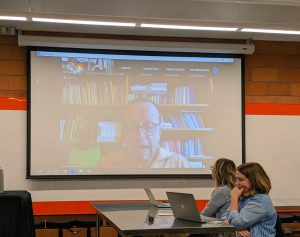 Image 1. Professor Massimo Montanari, May 23, 2023.
Image 1. Professor Massimo Montanari, May 23, 2023.
Professor Massimo Montanari from the University of Bologna emphasized that people’s taste encompasses not only flavor preferences but also cultural identities, traditions, and values. It operates as a way of conveying our individual and collective identities, mirroring our dietary selections and the various factors that influence them, including economic, social, and personal factors.
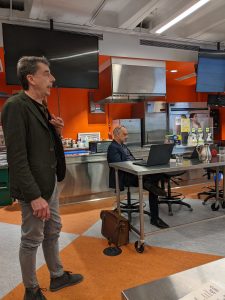 Image 2. Dr. Paolo Capuzzo, May 23, 2023.
Image 2. Dr. Paolo Capuzzo, May 23, 2023.
Dr. Paolo Capuzzo from the University of Bologna then delved into the political dimensions of food consumption in twentieth-century Europe, shedding light on the intricate relationship between food and politics.
Dr. Capuzzo elucidated how the pursuit of healthy eating became intertwined with a state-driven eugenics project, where a specific vision of health was enforced for the purpose of societal control. These food regulations extended beyond mere nutritional considerations, playing a pivotal role in shaping identity and belief systems.
The question of authenticity within the Slow Food movement is multifaceted. In progressive circles, it serves as a platform for promoting inclusivity, social justice, and the exploration of food origins. However, nationalist actors have misappropriated the notion of authenticity to perpetuate stereotypes and discriminate against immigrants. Thoughtful and nuanced discussions are imperative as we navigate this complex landscape, aiming to embrace inclusivity while staunchly rejecting discrimination.
Foodways of the Americas
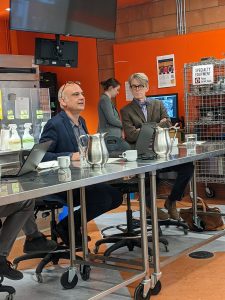
Image 3. Dr. Davide Domenici, May 23, 2023.
Dr. Davide Domenici from the University of Bologna provides valuable insights into the political significance of documenting indigenous foods. It serves as a deliberate political expression encompassing dimensions of identity, kinship, and governance for these communities. It also serves to fortify their cultural identities, perpetuate ancestral connections, and transmit invaluable knowledge from one generation to the next. By meticulously preserving their culinary traditions, these communities not only challenge prevailing notions of civilization but also demonstrate their remarkable resilience in the face of historical adversities.
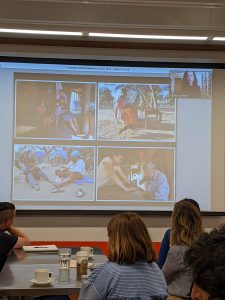
Image 4. Dr. Chiara Scardozzi, May 23, 2023.
In Dr. Chiara Scardozzi’s presentation from the University of Bologna, she unveils the pressing issue of territorial and food insecurity within the Gran Chaco region of Argentina. Her discussion sheds light on the stark imbalances prevalent in global agriculture, where the sustenance of certain regions coexists with the deprivation faced by others.
Dr. Scardozzi draws considerable attention to the pervasive neocolonial control and extractive practices embedded within the agricultural industry, which have directly contributed to deforestation and the prevalence of hunger among indigenous populations. The poignant statement, “Malnutrition came to us when we stopped eating from the forest,” highlights the significance of traditional food systems and the decline in nutritional well-being. Her scholarly work serves as a resounding call for the adoption of sustainable and equitable approaches to agriculture, challenging prevailing neocolonial dynamics and placing the well-being of indigenous populations at the forefront.
Indigenous Foodways Tasting Experience
Culinaria Coordinator/Chef Kelsey Kilgore with Special Guests First Fish, a social enterprise and indigenous knowledge-keeper Naulaq LeDrew-Doris demonstrate culinary traditions, which included beluga whale and salted cod processing and tasting.
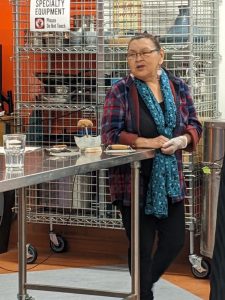
Image 5. Indigenous knowledge-keeper Naulaq LeDrew-Doris, May 23, 2023
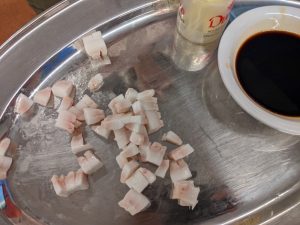
Image 6. Beluga whale tasting, May 23, 2023
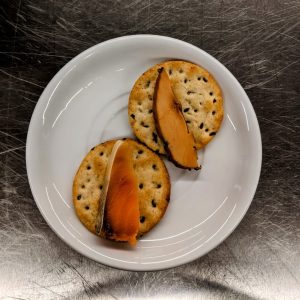
Image 7. Smoked and fresh trout tasting, May 23, 2023
The University of Toronto’s Scarborough campus employs a strategic approach to utilize its space by incorporating edible forgeable food into its forested areas through a collaborative effort between groundskeeper Mark Neilson and food scholars. Mark Neilson points out that while some may regard garlic weed as invasive, it actually presents an opportunity to create delectable pesto sauce. Remarkably, the campus offers a diverse array of foraged food, comprising nearly a complete meal. These edible landscapes also serve as invaluable educational tools, facilitating the exploration of food histories and functioning as outdoor classrooms.
For instance, the utilization of pine needles to brew tea, a practice learned from indigenous communities by early explorers, is worth noting. Not only does this tea have a long shelf life, but it also contains a substantial amount of vitamin C, which proved pivotal in preventing scurvy during long sea voyages. This practice serves as a tangible illustration of how perceptions of “good food” are profoundly shaped by a nexus of social and political factors and are intrinsically tied to specific times and places.
Graduate Student Panel Food Histories and Ethnographies
In a panel, Dr. Kelsey Kilgore described the ways that the Culinaria Kitchen lab functions as a research lab useful for engaging with community partners and connecting for joint action research projects. Jackson Guo went on to describe his PhD research on the histories of Chinese Distilled Liquor (Baiju) which is also a basis for an upper-year food studies course on global drinks. Janita Van Dyk presented her work exploring the diasporic food retailing of Italian immigrants, which is also related to PhD student Rosaria Moretti at York University, which recovers the food histories of Toronto’s Italian Backyard Gardens to further demonstrate immigrant place-making. Dr. Joel Dickau concludes the panel by presenting his archiving efforts of Toronto’s multicultural food history.
Day 2 – May 24, 2023 at Victoria College, University of Toronto
Histories and Sociologies of Drink and Food
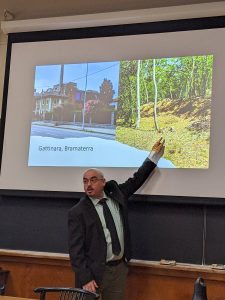 Image 8. Dr. Daniel Bender, May 24, 2023.
Image 8. Dr. Daniel Bender, May 24, 2023.
In this panel, the University of Toronto’s Dr. Dan Bender delves into the histories of fine wine, revealing narratives that transcend mere commercial transactions to delve into the intricate interplay of vines, rainfall, and taste. These narratives prominently showcase the relentless dedication required to work with the natural landscapes, terrains, and grape varieties to surmount adversities like hailstorms.
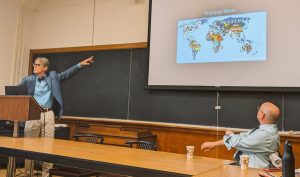
Image 9. Dr. Jeffrey Pilcher, May 24, 2023.
Dr. Jeffrey Pilcher of the University of Toronto highlights the paradoxical nature of beer diversity on a global scale, revealing that despite the extensive variety available, many beers share remarkable similarities in terms of their production methods, appearance, and flavor profiles. This uniformity can be attributed to the process of commodification, which standardizes manufacturing processes and flavor profiles. It becomes evident that the concept of diversity and innovation within the beer industry is predominantly fueled by marketing tactics rather than genuine craftsmanship.
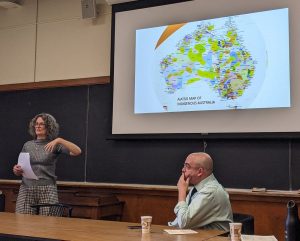
Image 10. Dr. Julie McIntyre, May 24, 2023.
Dr. Julie McIntyre discussed the historical exclusion of Aboriginal people from the consumption of fine wine. Past efforts to “civilize” indigenous communities led to restrictions on their access to wine, with missionaries actively promoting sobriety. The absence of suitable land for wine production on Aboriginal reserves in Australia further deepened the divide between indigenous communities and the broader mainstream society.
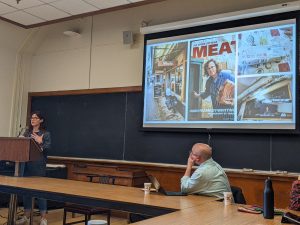
Image 11. Drs. Josée Johnston and Shyon Baumann, May 24, 2023
In the presentation on “Meat is Disgusting, Meat is Delicious” Drs. Josée Johnston and Shyon Baumann of the University of Toronto delve into the intricate and often contradictory relationship that individuals have with meat. While many find it delicious, there’s a simultaneous awareness of the environmental repercussions, health considerations, and ethical concerns regarding animal rights. To rationalize their choice to eat meat, individuals frequently resort to various justifications. These include the concept of “happy” or ethical meat represents one method by which people seek to reconcile their feelings of disgust or moral conflict surrounding meat consumption.
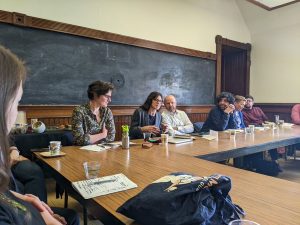
Image 12. Discussion of Drs. Bauman and Johnston work, May 24, 2023
In many perceptions, inexpensive meat, often linked to lower quality and ethical dilemmas, is unfairly stigmatized as being primarily consumed by those with limited means, despite its consumption being widespread across all demographics. Conversely, meat categorized as “happy” or ethical is often viewed as a healthier choice for both animals and humans, appealing to culinary enthusiasts and carrying a moral dimension, yet it may not be financially accessible to everyone. These observations underscore the intricate and multifaceted nature of food, revealing the diverse meanings and perceptions that society attaches to it.
Day 3 – May 25. 2023 at the Northrop Frye Centre, University of Toronto
Studying Food: Culinaria and Beyond
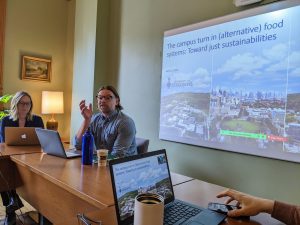
Image 13. Dr. Michael Classens, May 25, 2023.
In another panel, Dr. Michael Classens of the University of Toronto enlightened everybody on the role of university campuses as hubs of resistance, providing alternative food options in response to the worldwide resurgence of conservatism. This form of resistance finds expression through activities like cultivating, fostering intellectual engagement, and embracing alternative food consumption practices.
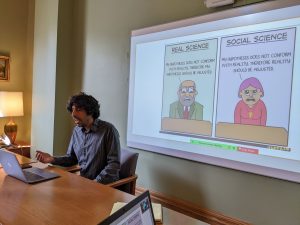
Image 14. Dr. Nino Bariola, May 2023.
Dr. Nino Bariola of the University of Toronto, in his presentation, highlighted the gap between people’s stated justifications and the actual rationale behind their food choices. In the realm of dining establishments, even within the fine dining sector, there is a prevalent tendency to market their offerings as sustainable, despite a lack of genuine sustainability. Moreover, it’s noteworthy that some of the foods served in these establishments may inadvertently contribute to the endangerment of certain species.

Image 15. Dr. Noah Allison, May 2023
Dr. Noah Allison of the University of Toronto contends that Latinx market vendors in New York employ a strategic approach in occupying and making use of street spaces as a form of resistance against development and gentrification pressures. In this manner, they assert their citizenship rights, albeit in a contested fashion.
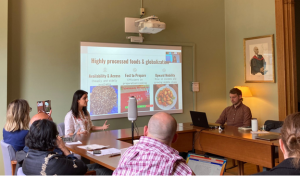
Image 16. Dr. Siera Vercillo, May 25, 2023
Dr. Siera Vercillo of the University of Toronto, discusses some preliminary findings on how a local urban food system in northern Ghana is changing and shaping people’s diets in contradictory ways. On the one hand, people are adapting to global food practices, like producing, selling, and consuming highly-processed ingredients and foods grown with heavy doses of inorganic fertilizer and agrochemicals. On the other hand, many people still maintain local practices, such as cultivating and selling ingredients grown nearby with minimal external technologies. Many different kinds of people -rich and poor – old and young – educated and illiterate- describe how they feel trapped in addictive cycles of taste.
ROUNDTABLE: FOOD STUDIES TO FOOD ACTION
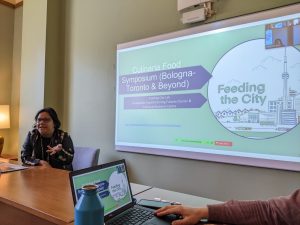
Image 17. Dr. Jo Sharma, May 25, 2023
Dr. Jo Sharma presents her, and her team’s shifting thinking and efforts focused on securing urban food security to food sovereignty for more socially just food systems. She describes the work of her Feeding City Lab engaging with community partners.
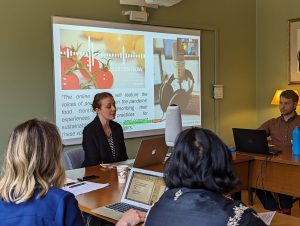 Image 18. Dr. Jaclyn Rohel, May 25, 2023
Image 18. Dr. Jaclyn Rohel, May 25, 2023
Dr. Jaclyn Rohel further expands on the efforts of the Feeding City lab to translate and mobilize research conducted with community partners for the public. She describes the podcast series, ‘Bringing Voices from the Food Frontlines to the Lab & the World’ that was started and developed by the lab’s team which we manage, and we listened to a trailer.
FOOD ARCHIVES AT THE FISHER RARE BOOKS LIBRARY
The last event of the symposium was to tour historical archival books in the Fisher Library given by librarian Elizabeth Ridolfo.
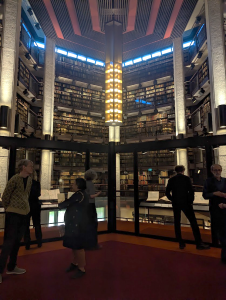
Image 19. Fisher Rare Books Library Tour, May 25, 2023
The symposium served as a dynamic platform for fostering engaging discussions and delivering insightful presentations that unveiled the multifaceted dimensions of food and its profound influence on our lives. Spanning from the cultural nuances of taste to the intricate political aspects of food consumption, the symposium ventured into a diverse array of perspectives, encouraging critical contemplation. It traversed various topics, including food authenticity, Indigenous food systems, and the political underpinnings of documenting Indigenous foods, enabling participants to deepen their comprehension of the intricate and interconnected relationship between food, culture, and identity.